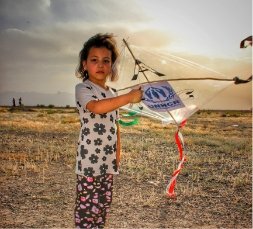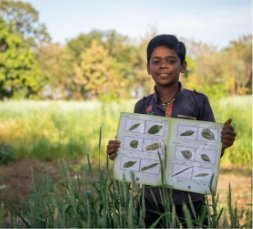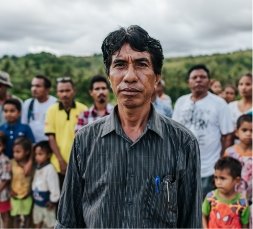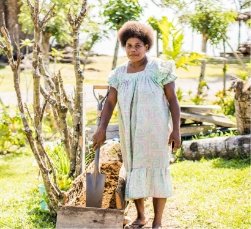Consolidated Appeal Israel and Palestine
(Last updated 11th January 2024)

ACFID has publicly stated its position on the conflict in the Middle East here.
The following text was written along Humanitarian Law and Principles guidelines, which centers the humanitarian needs of civilians.
Since Saturday 7th October 2023, there has been a catastrophic increase in violence between Palestinian armed groups and Israeli forces in Israel and Gaza. Civilians and civilian infrastructure including hospitals have tragically and unlawfully been the target of many of these attacks, causing unprecedented suffering.
As of January 7th 2024, almost 23,000 Palestinian people have been killed in Gaza. Up to 1.9 million people – 85 per cent of the population – have been displaced across the Gaza Strip. Almost 59,000 people have been reported injured. (Source: UNWRA). There have been reports of children forced to undergo limb amputations and women giving birth via C-sections without anaesthesia.
According to the WFP, 2.2 million people are in crisis or worse levels of acute food insecurity, with one in four people facing extreme hunger.
Since October, Gaza’s population has faced extreme shortages of food, medicine, electricity , water and fuel. Humanitarian groups report impeded access to those in need.
Shelters housing Gaza’s displaced population are extremely crowded, and consequently sanitation remains a key concern. With hundreds of people per toilet and thousands without access to clean water, there is a grave risk of disease outbreaks. Much critical assistance is needed, including bedding, tents and winter clothing. (Source: UNOCHA)
There have also been outbreaks of violence in nearby regions, including the West Bank and along the Israel-Lebanon border.
The humanitarian sector continues to call on all parties to the conflict to find a peaceful resolution, to uphold international law and protect civilians, including health and humanitarian aid workers.
ACFID members and local partners are on the ground and responding with life-saving humanitarian assistance, such as food, shelter, infrastructure, and health. Your donation will assist organisations to continue carrying out this crucial work. We will continue to update this page with additional members’ appeals as they are launched.
Please find out more about the valuable efforts of our members and how you can contribute to their responses below.
We will continue to update this page with additional members appeals as they are launched.
You can be assured that your support to any member listed below will meet identified needs on the ground. The standards by which ACFID members make appeals for donations are set by ACFID’s Code of Conduct. This includes a responsibility to provide clear information to their donors on the emergency and the work they are doing with affected communities.
All ACFID member appeals below have been checked and meet Code of Conduct requirements. Find out more about the standards ACFID members adhere to.
ACFID members responding
Act for Peace
Act for Peace is supporting our local partner on the ground, The Near East Council of Churches Gaza (NECC), who runs three health clinics in Gaza that are providing vital medical care to some of Gaza’s most vulnerable neighborhoods. A significant influx of casualties, is anticipated as airstrikes continue. NECC remain committed to providing lifesaving medical care to civilians caught in the middle of this crisis and are working in close coordination with ACT Alliance members to actively assessing the situation and prepare to be able deliver effective support to affected communities.
ActionAid Australia
ActionAid condemns all attacks and violence targeting Palestinian and Israeli civilians. We call for an immediate ceasefire to prevent further loss of life. As a humanitarian and women’s rights organisation, we will prioritise the leadership and needs of women and girls in our response.
The people of Gaza are in the middle of a humanitarian catastrophe.
With Gaza completely cut off from food, electricity, water, and fuel, a rapidly escalating humanitarian crisis is affecting over two million people, with women, children and those with disabilities among the most impacted.
Hospitals are already running out of crucial medical supplies, and with no electricity, are unable to provide lifesaving health services to the growing number of people in urgent need.
The unprecedented order to expel 1.1 million Palestinians, humanitarian staff, and medical personnel from North Gaza has worsened an already dire humanitarian situation.
Anglicans in Development
Funds will go to Al Ahli Hospital, a hospital in Gaza that is run by the Episcopal Diocese of Jerusalem. Al Ahli will use the funds to provide emergency medical services to civilians who have been injured in the recent escalation of violence. As the Gaza conflict spills over to the West Bank, with supply chain disruptions and restrictions on movement leading to widespread job losses and increasing poverty, AID in December 2023 decided to allocate a portion of its Gaza funds to address needs in the West Bank
Anglican Overseas Aid
Help the al-Ahli Arab Hospital provide 24 hour emergency care for all people impacted.
https://anglicanoverseasaid.org.au/our-work/emergency-appeal-ahli-arab-hospital/
Anglicans Relief and Development Fund Australia
ARDFA is working through partners to provide emergency relief to those affected by the crisis as the situation allows. We are partnering with churches and non-profits to bring aid and support to survivors of the conflict in both Gaza and Israel.
https://ardfa.org.au/global-disaster-fund/posts/israel-gaza-crisis-appeal
Australian Lutheran World Service
ALWS partner, LWF, continues to provide cancer treatments and kidney dialysis services to Palestinians from Gaza and the West Bank, through the Augusta Victoria Hospital in East Jerusalem. Through Action by Churches Together (ACT Alliance) ALWS’s partners continue to provide Humanitarian assistance to people affected by the conflict.
https://www.alws.org.au/news-and-stories/israel-gaza-crisis/
Baptist World Aid Australia
A new wave of violence in Israel and Palestinian territories has left thousands dead, and over one million displaced. A gift to Baptist World Aid’s Middle East Crisis appeal will help deliver much-needed medicines and medical supplies to equip local clinics, hospitals, and healthcare workers providing essential services in Gaza and the West Bank—including all people in need of care. It will help to reduce preventable deaths among newborns and children as a result of malnutrition and limited access to water and medicines, and improve access to mental health and psychosocial support care for people experiencing trauma.
Caritas Australia
The alarming escalation of violence in the region is leaving people in Gaza in urgent need of humanitarian aid. Caritas Australia is supporting its partners and their local networks on the ground to respond to the immediate needs of people displaced based on the priority needs of food, water, shelter and psychosocial support.
https://www.caritas.org.au/donate/emergency-appeals/gaza-crisis/
Islamic Relief Australia
Islamic Relief Australia is responding to the growing humanitarian crisis in Gaza. We are currently distributing medical supplies, NFIs, food and water from our existing supplies and we are partnering with a UNICEF to deliver further assistance. In addition, we are ready to scale up our response once the blockade is lifted. Islamic Relief has been in Gaza since 1997 and we are planning to stay and assist with the rehabilitation and reconstruction phases going forward. We have extensive experience in delivering social support, health and medical support, education, livelihoods and WASH. Please follow us for further updates
https://islamicrelief.org.au/our-work/emergencies/gaza-emergency-appeal/
Plan International Australia
As a humanitarian organisation that advocates for the rights of children everywhere, Plan International is devastated and horrified by the conflict that has erupted in Gaza and Israel. Right now, children in Gaza, the West Bank and Israel are suffering when they should be living their lives without violence and fear.
Our Plan International offices in Egypt, Lebanon and Jordan are rapidly scaling up our response with our partners, like the Egyptian Red Crescent, to reach children in Gaza and be ready for the influx of Palestinians seeking safety across the border into neighbouring countries. We urgently need support to provide life-saving humanitarian aid to as many people as possible.
Project Rozana
With the health sector at the forefront of this crisis, Rozana is actively bridging the gap in medical care with a tailored a suite of projects that focus on providing immediate relief while also addressing the mental health challenges facing our dedicated healthcare allies and alumni.
These initiatives include:
• Providing critical capacity building for 12 key partner hospitals in Israel, Gaza, East Jerusalem and the West Bank as well as urgently needed psychosocial support to strengthen their teams;
• Fast-tracking the completion of the Hebron Rehabilitation Center for healing long-term civilian injuries;
• Boosting our efforts to ensure delivery of primary care for vulnerable women and children in isolated West Bank areas who have been further impacted by the war.
https://www.projectrozana.org.au/campaign/12/emergency-relief-appeal
Save the Children Australia
https://www.savethechildren.org.au/donate/appeals/childrens-emergency-fund
UNICEF Australia
https://www.unicef.org.au/donate/children-gaza-crisis-appeal
Union Aid Abroad (APHEDA)
Donate Responsibly
Australians understand the impacts of humanitarian crises and are incredibly compassionate and generous. Unfortunately, if we are not smart in how we do that, we can actually cause more problems.
Unrequested goods such as food, clothing and medicines sent to countries experiencing crises consistently end up in landfill. Unrequested goods block valuable space at ports and airports and can prevent vital aid getting through. Cash is fast, flexible, and is used to meet the immediate and changing needs of those affected.
With cash donations goods can be sourced and purchased locally. This supports local businesses, keeps people in jobs, and stimulates the local economy.
If you want your donation to have a long-lasting impact, consider donating cash.
Find out more about how to donate responsibly at: donateresponsibly.org.











